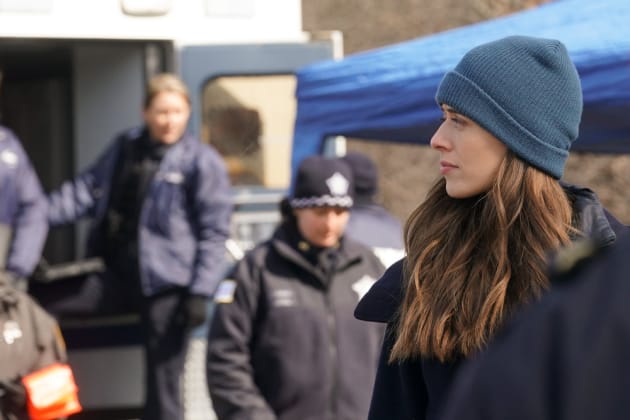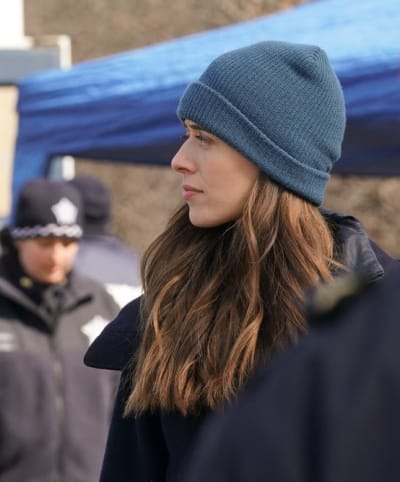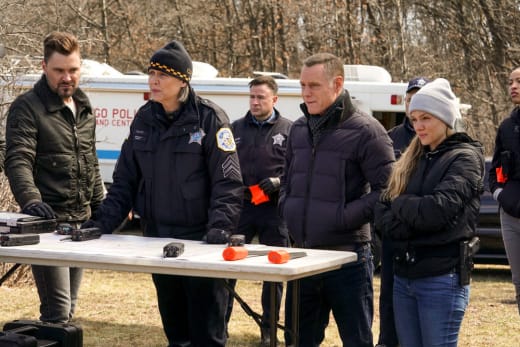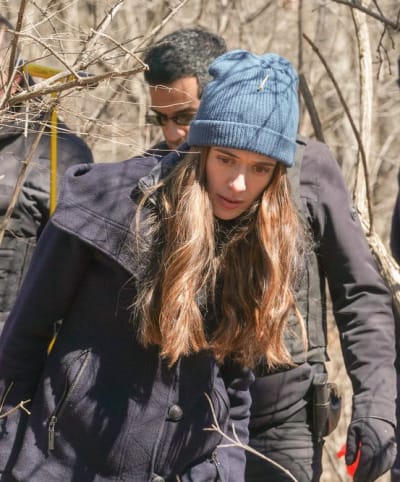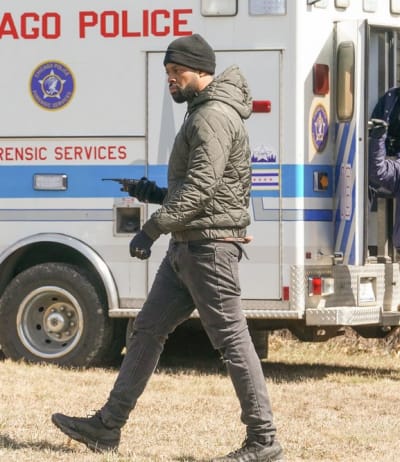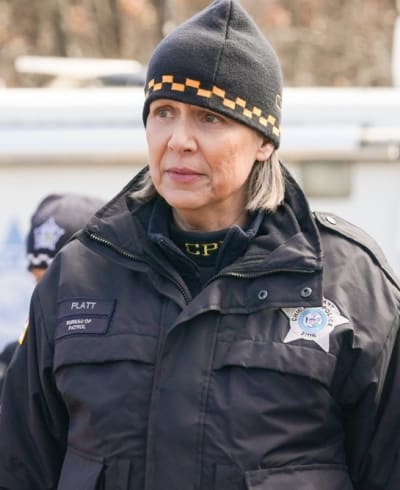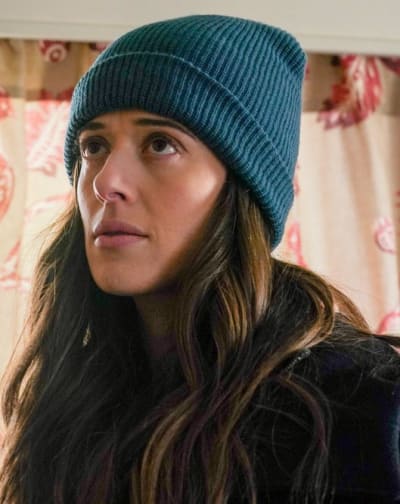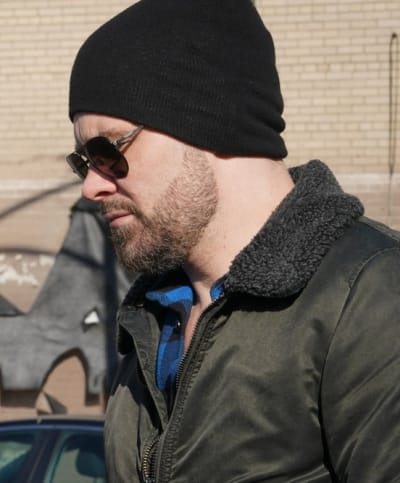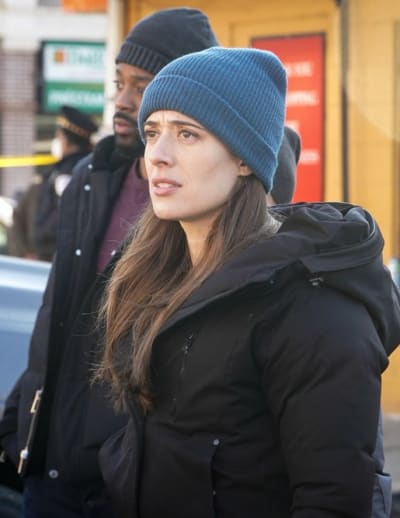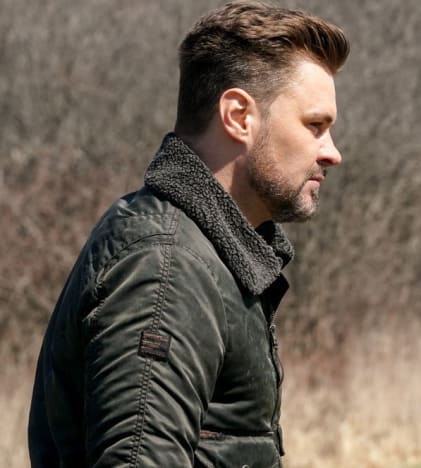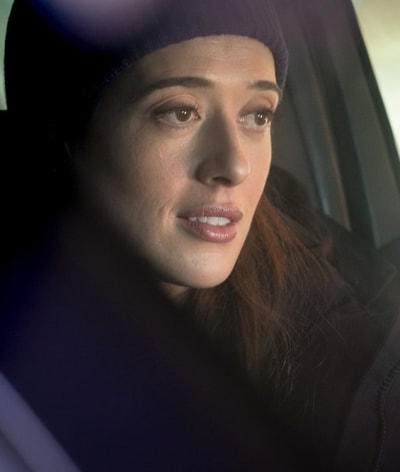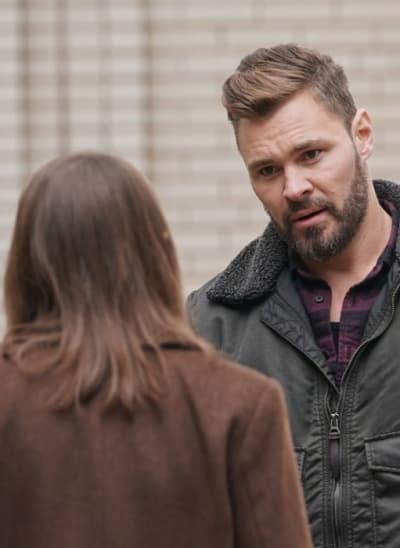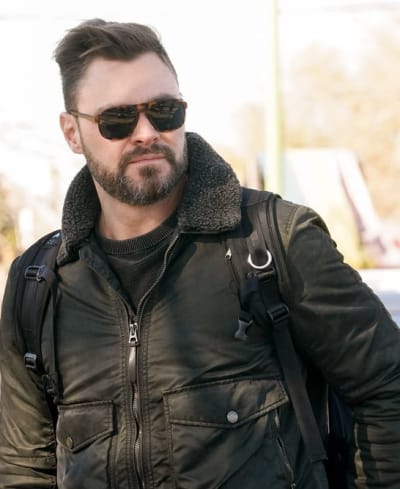Why not, indeed?
The back half of the season has done well by giving us these dark, intriguing cases and attempting to balance the characters in each installment.
While there were obvious leanings toward Burgess and Ruzek during Chicago PD Season 9 Episode 20, the case took precedence, and everyone was thoroughly involved in a manner that felt like the early days of the series.
As far as cases go, this was another deliciously dark and layered one. They’ve taken some huge swings with some of the cases this season, and they’ve succeeded in capturing the perfect tone and getting us invested.
It turns out that Chicago PD, when it delivers shades of Criminal Minds, with its own spin, of course, is the makings of the perfect formula.
You’re going to get eaten alive in prison, I’m going to personally make sure of it. You understand? Huh?
Adam
How could you not be utterly captivated by this case? It was dark, gruesome, provocative, and emotional.
As it was so vital to the case and connected to Burgess and Ruzek’s personal lives with Makayla, the thematic approach to memory was handled wonderfully.
The latter’s arc didn’t pull too much away from the case either, and we didn’t have Burzek bickering or whatever else peppered throughout the installment while they were working it.
When they partnered for the case, it was exclusively about finding Wheaton and providing this closure for Daniel. The connections they would draw from their experience there were reserved for when the case was over, and it was back to the two of them having a discussion and determining what their future would look like.
I have no idea what’s real and what isn’t, and I’ve spent the last 30 years of my life trying to figure it out, but I’ve gotten nowhere.
Daniel
Again, that type of classic Chicago PD reminds you of the early days when they delved into the personal lives and dynamics of the characters we adore without detracting from the procedural component the larger audience tunes in for or pulling away from the other characters.
The hour gave us a few scenes with Kim and Hailey working together, and it’s refreshing that they’re making a more conscientious effort to take full advantage of mixing up the dynamics.
They were first on the scene of the married couple, and to say it was gruesome is an understatement. It was monstrous; this couple got bludgeoned to the death to the point of them being unrecognizable.
And while the killer thoroughly cleaned the crime scene well, he left so much blood all over the bed, belying how awful their deaths were.
The lullaby playing, book, and bleach baths were all incredibly creepy. But it was the type of case that grabbed you instantly. Halstead having to hold off the victims’ children in the background from racing into the crime scene was this small scene, but it effectively conveyed how disturbing all of this was.
But things didn’t kick into gear until Kim found that 28-year-old cold case connecting some of the elements from the crime scene. The footage of police trying to get information from a young Daniel was heartbreaking.
From that point forward, Burgess was on a mission to get to the bottom of this case. While it wasn’t exclusively said, it’s one that touched her somehow, and one can only imagine it’s because she’s a mother now.
Burgess and Ruzek’s initial discussion with Daniel was upsetting, only in the sense that you had this adult man who harbored all of this trauma, and at some point, he spent years getting told that what he experienced wasn’t real.
Memory is a tricky thing. The mind conjures up something to protect itself from trauma and other things. Sometimes what we think or know to be true isn’t, or our memories are warped.
Kim: Why did you believe Daniel?
Dr. Magnason: You don’t?
Kim: No. I don’t know what I believe except, that I’m glad for him either way that he doesn’t remember.
It’s difficult to parse through the mind and make sense of what’s real and isn’t, and by the time he was a teenager, all but one therapist determined that the story he told the police when he was four wasn’t real.
It made you immediately feel for him. And it also made you grateful for the one therapist who saved all of his files because he knew one day that they would be of use.
Oh, Burgess, she’s had a tough season, and it’s stressful every time she follows a hunch and takes off to do something by herself.
Whether meeting a shrink alone at his home late at night or heading back to the crime scene by herself and exploring the attic, there was a layer of suspense because of her poor track record and a fear that she’d end up in danger.
This man learned how to be clean in the penitentiary from the pros.
Kevin
I just loved how they pieced things together with this case using the barest of things without it coming across as unrealistic. Instead, it was a sign of solid police work on the whole team’s part.
The pink insulation they derived from Daniel’s memory of “pink dust falling like snow” was a prime example. And the realization that all the rowhouses were connected and accessible through a shared attic was as crucial as it was disturbing!
Kim’s instincts were on point throughout the case, and she recognized Wheaton as the killer the moment she saw him. His age was right; he didn’t have any hair to avoid leaving DNA, and he was staking out rowhouses.
He also had a background in carpentry. It was such a risk picking him up, though, but the Halsteads followed her lead, captured Wheaton, and the only thing Voight could suggest was pressing him, making use of the 48 hours they could keep him, and hoping that they’d find more substantial evidence along the way.
The sequence of all of the unit taking a shot at interrogating Wheaton was a great one, and I love when the series uses its trick shots and sequences with the whole team.
In the end, Daniel was crucial in getting Wheaton on everything. You felt for him when he knew he’d face triggering himself by pouring over the murder board, hoping that something would stand out.
And in hindsight, a decent defense attorney would have a field day if they found out about that maneuver. But all these fractured bits and pieces of Daniel’s memories formed into something.
He recognized the inn associated with Wheaton and the book at the other crime scene. And Burzek saw the same curtains Daniel remembered from his youth and similar insulation at the inn.
But it was the canvass search of the area that clenched everything. Others found the bodies of Daniel’s parents, and Burzek found the RV he remembered, still intact, filled with photos and things as if frozen in time.
They were able to give Daniel the closure he needed and deserved. And they also put his mind at rest, so he knew that he wasn’t crazy or too traumatized once and for all.
His parents weren’t abusive, and he wasn’t blocking them out. They were loving. It felt like we were intruding on an intimate, vulnerable moment when Daniel watched the old footage of his family. It was such a beautiful moment.
Burgess begins to realize what Makayla could face if her memories came back through the hour. Kim went from unsure if she believed Daniel, herself, to seeing he was telling the truth and how all of this affected him as an adult.
It was a bit of a wake-up call for her. The opening scene with her therapy session with Ruzek about Makayla showed a woman resistant to the idea that her kid could be anything other than OK.
But how much of that is about Burgess? She’s been through an incredible amount of trauma herself and probably needs therapy too. She’s spent all season behaving as if she was “fine,” when realistically, we know that she probably isn’t and shouldn’t be.
Makayla is a young girl who has experienced a lot of trauma in a short amount of time and many changes. It will always be possible that she’s not perfectly okay, and it’s not a reflection that something is wrong with her, just her reality because of her experiences.
Ruzek is far more receptive, and I loved that he spent the rest of the time thinking about what’s best for Mack, but he didn’t broach the topic or impede on things with Burgess until the end of the hour.
Adam: I’m going to buy it. I loved this house growing up. My childhood, I mean you know, it wasn’t the best. But this house, man, this house was. It’s always full of light. Big ass yard. Best hiding spots in the neighborhood for capture the flag. The banister, you can climb the banister and it won’t ever fall out. I have the best memories here. So I’m buying the house for Mack, for us, for you.
Kim: Adam.
Adam: Look, I can keep the undercover apartment. I’m not moving in.
Kim: You can’t buy me a house.
Adam: Why not? I get it we’re not perfect right now, but why not this? Kim, she might remember.
Kim: I know. I know.
Adam: Either way, we can give her all the best memories in the world, to protect her from that. We can give her that here, together. Why not?
The irony of Burgess’ emphasis that Mack is her child is that Ruzek has displayed the most character growth in this storyline. We’ve watched this hotheaded and occasionally aimless man transform into a more levelheaded dad who wants stability.
The way he carried himself and handled Daniel throughout the case, while subtle, displayed the paternal energy he radiates now and applies to cases.
He saw his kid in this adult man who experienced such trauma, and he connected the dots in that way, only cementing his need to provide Mack a stable, loving home environment whether he lived with her or not.
We got beautiful bonding moments, from him pushing her on the swing at the park to carting her around.
From bringing her to his childhood home to help clean up, showing her his baby pictures, and adorable footage of him playing dress up like a true Girl Dad, something that reminded me of him letting her paint his nails, Ruzek is undeniably Mack’s dad.
Kim: Anything you want to say before I read you your charges?
Wheaton: Are you a good mother?
I still do not understand what they’re doing to Burzek or why they did all of this to get us to this point where they may live in the Ruzek home together like a happy family.
But if this means we get to move past how frustrating Kim has been with this storyline and how terribly she’s treated Ruzek, so be it.
If he’s brushed past all of that, showing off his growth and maturity by being the bigger person and focusing on Mack and their family, regardless of how much Kim jerks him around with it, I’ll take that.
It was frustrating when Kim mentioned that the apartment they put a downpayment on together was available, and she intended to move into it with Makayla anyway, without him.
Sure, Mack should have a new place where she feels safe, but it felt wrong that she was still icing him out.
But Ruzek laid down the gauntlet with this suggestion about the house. He’s been consistent with what he wants.
He wants their family to be Mack’s father and provide a safe, happy, loving environment for this sweet girl. Ruzek hasn’t made any assumptions about what he and Burgess are and can be to one another romantically, but he’s okay with where things are.
She’s his best friend and family, regardless of whether they’re a romantic partnership or not. He’s consistently let her know this no matter how many times she’s pushed him away and presumably questioned if it was real.
Maybe now she can believe him, let her guard down, and be the family they’re meant to be. So, why not, Kim? Why freaking not?
Ruzek’s character growth has been the saving grace of this messy Burzek storyline. Nevertheless, I’ll forgive how frustrating things have been for these two for no good reason if Kim says yes.
Over to you, Chicago PD Fanatics.
Did you love this case? Should Kim say yes? Sound off below.
You can watch Chicago PD online here via TV Fanatic.
Jasmine Blu is a senior staff writer for TV Fanatic. Follow her on Twitter.
